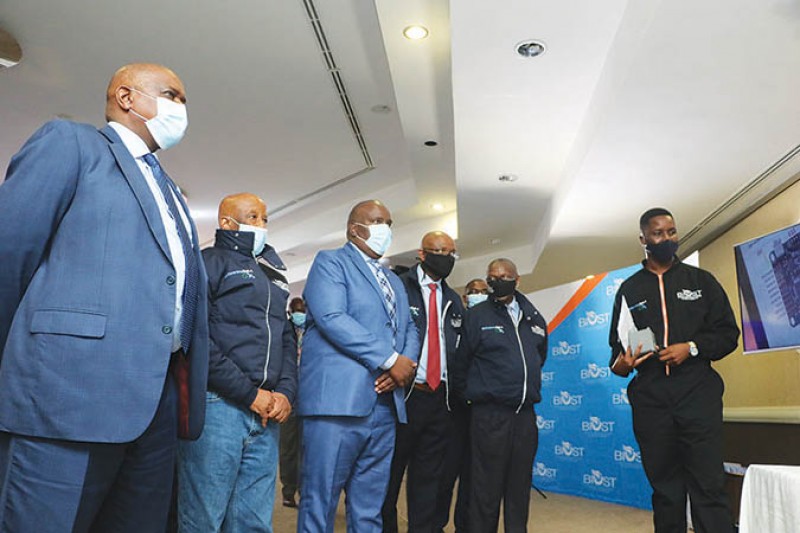Botswana Launches Ambitious Space Orbit Programme
Monkagedi Gaothobogwe | Monday December 21, 2020 15:45


The programme will shoot into orbit its own home-grown miniature space crafts, the smallest and modern satellite cubes that are fast replacing the traditional gigantic space ships in space missions.
The launch of the space programme is consonant with Masisi’s development agenda of harnessing a knowledge-based economy as he proudly singled out the university for its remarkable response to his rallying call: “If there is an institution that has responded to the clarion call of the leadership and whose response had fitted like a hand to gloves, it is BIUST.'
Masisi, who had been involved with the inaugural space programme and embraced it from the beginning announced at the launch that despite the hardships brought about by the coronavirus (COVID-19) to government budget and national economy, it is these adverse effects of the pandemic that had emboldened commitment to invest in the space race and harness it.
“It will take three years, will require full commitment and selfless dedication. It will be demanding as it is the first of its nature to launch a satellite in space. However, if the data is mined right, and market forces respond enough, our trade in the African space should markedly improve in the beef industry so that the reproductive capacity and genetics of our beef is improved,” the President added.
The Botswana space race mission targets to be ready to send its own cube satellite in three years, initially sending three of these types for earth observation missions, with the ambition of later sending as many as six to 12 units because, according to the lead scientist Dr Bokamoso Basutli the many, the better 'to create a constellation, for purposes of data backups, risk reduction, and data securities”.
Unlike other countries which have gone the route of contracting established space mission heavyweights like Russia and China to launch their satellites for them, the Botswana space mission will be unique in that it will be truly its own, delivered by the Botswana International University of Science, Technology (BIUST) in collaboration with local, regional and international partners.
The space mission is initially targeted to mine data for the improvement of two industries in Botswana; tourism and agriculture, to help reposition Botswana’s tourism and agriculture industries to be among the best performers and creators of sustainable employment using modern technology backed by data mined from the space missions.
Real-time virtual tours of Botswana’s signature tourism sites are some of the products targeted for development, harnessing data mined by the Botswana space missions.
The youthful BIUST lecturer Basutli from the Department of electrical computing and computer engineering and group leader, Signal Processing Systems network, told the audience at the launch of the Botswana space mission held at the Pavilion, show grounds that, 'We will be developing spacecraft, ground station, design and model the orbits to be traversed by the spacecraft”.
The lead scientist hailed the cube satellite concept as incredibly affordable; having opened doors to universities and governments to participate in the space race.
Like a mobile phone gadget loaded with electronics and software, the cube satellite, communicating with the ground station using antennas, and powered by solar energy, gathers data from its orbit and send them back to earth, while below, at its ground station, the team perform altitude control, process the data and interpret it for harnessing.
According to Basutli, the cube set will be designed in-house at BIUST, while some skills, like laboratory tests, will be outsourced initially, but was ambitious that with the state of the art proto-types that the Botswana team aim to develop. He said, in future, Botswana will be able to test its own satellite.
Dr Basutli hailed government’s support of this programme, saying that the decision has secured new careers for Batswana who will be trained to work at the Botswana space station, adding that BIUST will be training students from ground zero to the launch of the programme, as BIUST now has space programme frameworks in its curriculum.
The BIUST lead scientist says it is ideal for Botswana to have its own space technology because as a country it needs independence so that it is in control of its space missions.
The scientist also raised a critical issue of high-security threat for Botswana if it is caught unprepared if China’s digital currency concept, which will be block-chain based, gets global recognition only to find some countries dependent on others for satellite, hence missing out on the opportunity to mine the digital currency, adding that in such moments, Botswana should have its own interface to its own space.
The BIUST scientist also said the space missions can in future be harnessed for self-drive cars that are being developed as they require powerful satellite imaging of roads, adding that such data can be mined and sold to operators as in the example of a company called Digital Globe, which provides Uber with 30cm resolution imaging of roads and streets.
However, Basutli says dramatic failures in these missions are a part of the success and should be expected and embraced.
This year alone, for example, space technology giants, China, has had four dramatic space launch disasters, including the Kuaizhou-1A satellite launch failure in September, while the United Arab Emirates’ P6 billion satellite launch also failed in 2019 as the rocket, Flight VV15, lost signal six minutes after lift-off. Elon Musk’s prototype of their space tourism starship, built by SpaceX exploded upon landing during testing on December 9 this year, while a similar space tourism starship by Virgin Orbit rocket failed in May during a test launch.
Dr Basutli says even if they experience failures, investment in human capital will have been the immediate achievement.
The BIUST scientist added that his department is also collaborating in 6G research, with a university in Finland, and a reputable international mobile phone company.
